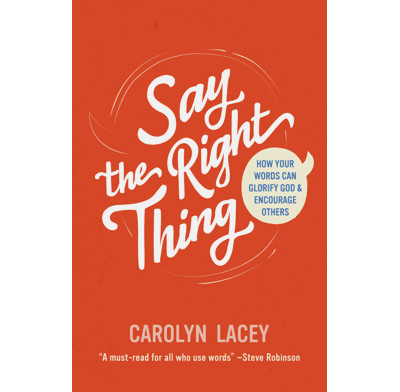The power of both the spoken and written word to cause damage has weighed on me over the years. It’s made worse by our media age, where “we communicate all day [and so] give ourselves unending opportunity to sin with our words.”[1]
Of course, this is nothing new, for the Bible gives similar warnings about the danger of the tongue:
So also the tongue is a small member, yet it boasts of great things. How great a forest is set ablaze by such a small fire! And the tongue is a fire, a world of unrighteousness. The tongue is set among our members, staining the whole body, setting on fire the entire course of life, and set on fire by hell. (Jas 3:5-6)
Yet, dire warnings about the dangers of the tongue can be pretty depressing on their own. For speech can also be used in wonderfully encouraging ways—to edify, to praise, and to speak words of hope:
Gracious words are like a honeycomb,
sweetness to the soul and health to the body. (Prov 16:24)
Carolyn Lacey’s new book Say the Right Thing hits the balance well. She doesn’t hesitate to show the dangers of speech that tears down, but her goal is to explore a hopeful vision for our speech along with practical examples of how to put it into practice. For, “the Bible offers a vision for our speech that goes beyond simply being well-mannered and not causing harm.” (10)
As such, she explores speech through seven lenses—speaking wisdom, truth, beauty, comfort, kindness, hope, and praise. There is obviously overlap amongst all of these, yet this breakdown helps to tease out each in more detail.
I’ll focus on three that I found insightful, both in their challenge and encouragement.

Say the Right Thing: How Your Words Can Glorify God and Encourage Others
Say the Right Thing: How Your Words Can Glorify God and Encourage Others
Words are powerful. They sink deep into our minds and our spirits. They can build others up or put others down. Many of us want to “say the right thing,” but we don’t know how to.
This positive, constructive book delves into the Bible to show us how to overcome specific temptations, such as gossip or angry words. But it also goes much further. It shows us how we can use our speech to bring beauty, hope, truth and comfort into the lives of those around us—and to give glory to God.
The Bible offers a vision for our speech that goes beyond simply being well-mannered and not causing harm.
1. Speaking Kindness
Lacey describes kindness as “a deliberate orienting of our hearts towards others, even when they don’t deserve it.” (79) God’s kindness is linked to his mercy, it is undeserved. Showing kindness to others acknowledges our shared humanity and our shared need for grace.
I appreciated Lacey’s exploration here for kindness can include instruction (for example, in parenting). It also impacts our digital world: kindness calls us to remember there is another person at the other end of a text or social media post.
Ultimately, our kindness in words can be a witness, and it is modelled by Jesus who offers us forgiveness. I found this to be a much higher calling to kindness that the bland idea of being nice and generally getting along with people. This is a definition of kindness I can soak myself in.
2. Speaking Hope
Many of us struggle to speak about our hope—to be a bold witness to others. We might hesitate to speak to our unbelieving friends about Jesus, concerned about offending or being awkward, so we err towards silence.
The prior step however, is “always being prepared to make a defence to anyone who asks you for a reason for the hope that is in you.” (1 Pet 3:15) Lacey’s suggestion is to know where the people in our lives need hope and point them to how Jesus offers it. Practical and specific prompts help the reader to consider how they can do this in different situations.
3. Speaking Truth
In our current age, speaking truth is no longer a self-evident concept. Now people talk about speaking my truth, or your truth. But the truth is the truth of Jesus, who come to earth as God’s Son, and who died and rose again offering salvation to all who believe.
Lacey explores two main weaknesses in speaking truth. The first is that we confuse “speaking the truth in love” with comfort—that is, we avoid the discomfort of speaking truth. How often do we avoid speaking truth and just stay silent? Yet speaking truth is an element of spiritual maturity and part of being in community:
Therefore, having put away falsehood, let each one of you speak the truth with his neighbour, for we are members one of another. (Eph 4:25)
One other weakness is being so committed to speaking truth that we tear down rather than build up. Our goal should be not only to call out sin, but rather to call one another to holiness:
Speaking the truth in love is less about correcting every viewpoint we disagree with or every under-developed belief another believer expresses, and everything to do with building one another up with the word of truth in a manner than is loving and reflective of Jesus. (33)
A Dual Vision
A dual vision shapes this book: look up to Jesus, and then look out to see how it shapes our speech with others.
Other chapters call us to speak things that are beautiful and good. Most of all, this means training ourselves to look for things that reveal God’s goodness and sharing them with others. For example, speaking comfort is anchored in an understanding of the type of comfort God gives, most ultimately that our sins are forgiven.
This dual vision which first directs us to the Lord is evident from the opening to the closing pages. If we are to grow in wisdom in our words, we need to know God through His Word. The book culminates in discussing praise—yes, we should be people who praise others, but our ultimate joy and purpose is to praise God with confidence, for Jesus is worthy.
Each chapter ends with discussion questions which would be great in a small group format, or when reading with someone one-to-one. If anything was missing, it was perhaps that there was no focus on Jesus being the Word made flesh, the “glory as of the only Son from the Father, full of grace and truth.” (Jn 1:14) This could raise our vision even higher. Jesus is the Word who brings life; as his followers our own words should aim to do the same. However, it’s a minor point. Overall, it’s a very readable and accessible book that will benefit all of us who use words—that is, everyone!
[1] Tim Challies, The Next Story, 80















